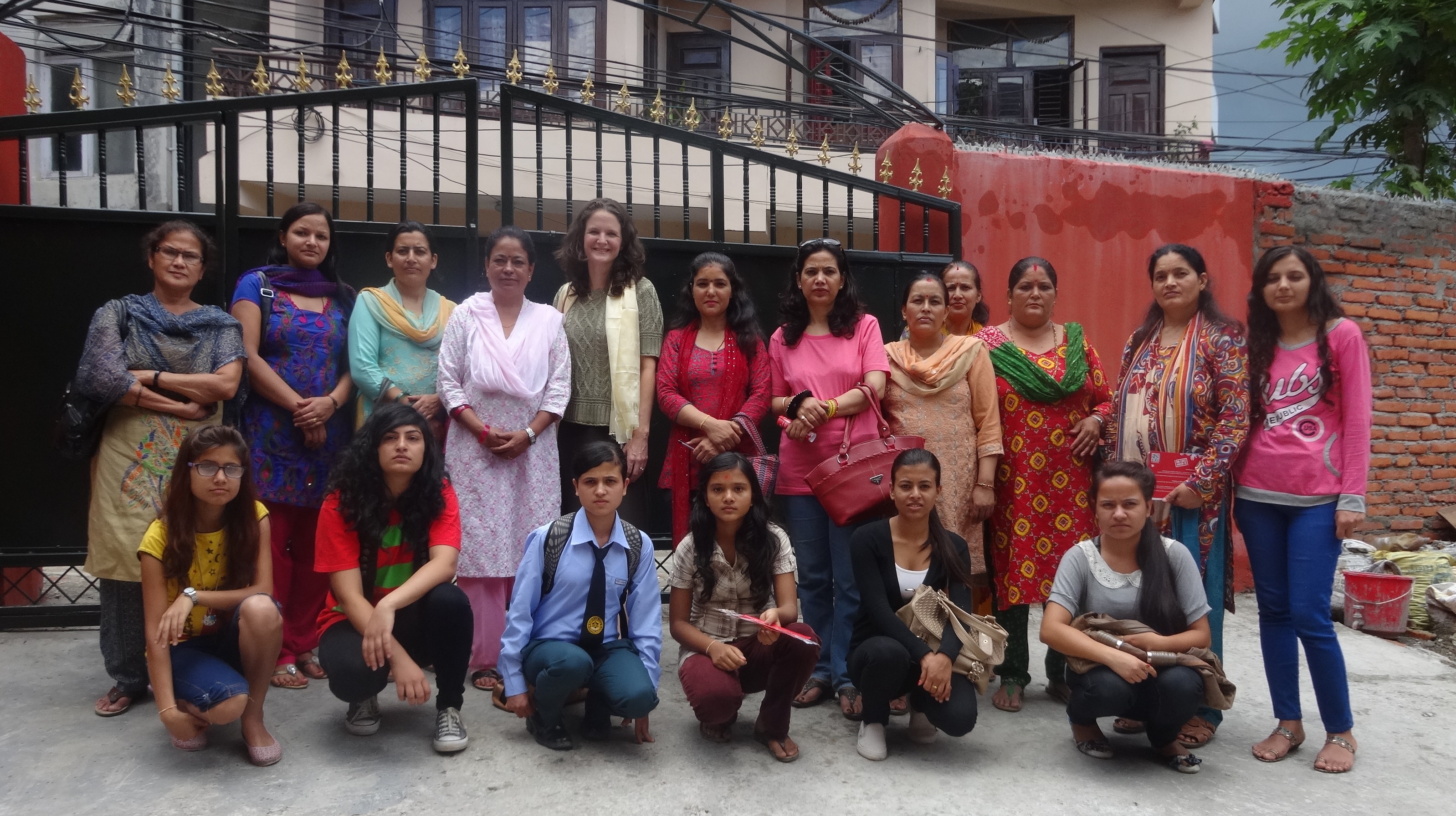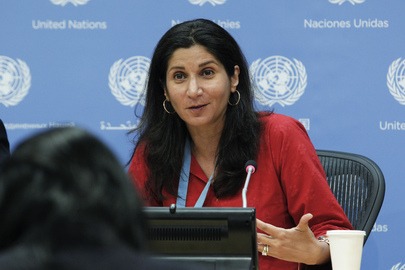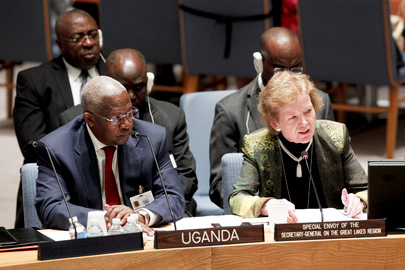The Big Picture: Women Call for Action in DRC; PeaceWomen and WILPF-Nepal-- PeaceWomen E-News, August 2013
If you have any difficulty reading this newsletter in HTML, please view it online.
Life has been slower than usual over the last month in New York as many colleagues both in Europe and in the US are taking holiday. However, not everything has been quiet. As we all take a brief breath before preparing for the whirlwind of advocacy this fall, we take the time to step back and examine the big picture. Reexamining what peace, freedom, and justice look like from the ground up can clarify how to move forward in a way that is both strategic and effective.
PeaceWomen welcomes several events this month that highlight the importance of stepping back and taking an integrated approach to peace and security. The first ever regional conference on women, peace, security and development in the African Great Lakes region was held July 9-11 in Bujumbura, Burundi. This meeting linked issues of Women, Peace and Security to issues of development and illustrated how broader discussions of sustainable development at the UN could be strengthened. Follow-up events in New York, including a July 23rd side event and a July 25th Security Council debate on the DRC and Great Lakes region, continued the political momentum on these issues. WILPF's PeaceWomen worked actively with the NGO Working Group on Women, Peace and Security and other key partners to highlight the importance of addressing the root causes of violence and war in these discussions. As crises accelerate in such places as Syria and Egypt, we reiterate the importance of strengthening women's participation in peace processes, and working to reduce inequality and prevent conflict to stop other crises before they start.
This month, PeaceWomen's Abigail Ruane flew to Kathmandu and met with WILPF-Nepal members to strengthen work in preparation for WILPF's 100th anniversary. As governments like Nepal work to develop translating global commitments into local action, civil society including WILPFers around the world will be key to holding governments accountable.
The Security Council has taken important steps toward promoting justice by addressing impunity on issues of sexual violence this year. However, peace has no silver bullet. Peace and security for all require a comprehensive approach, concrete mechanisms, strong financing and political support, inclusive participation, transparent monitoring and evaluation, and an unwavering commitment to promoting women's full and equal rights and leadership at every stage of an ongoing and continuously evolving process. As we gear up for the September General Assembly, October's UNSCR 1325 anniversary, and November's Global Review of 1325 National Action Plans (NAPs), we at PeaceWomen look forward to working with all of you to connecting the big picture with day to day action, and creating a world of greater peace and freedom for all.
In this edition, we feature CEDAW's endorsement of WILPF's recommendations on the DRC and PeaceWomen's visit with WILPF-Nepal. We also include initiatives urging women to have a place in the negotiating table and a training workshop on gender responsive peacebuilding. Additionally, we highlight women in Nepal protesting for 33% representation in the next election and a report on the significance of increasing the role of women in UN peacekeeping.
PeaceWomen and WILPF-Nepal in Kathmandu
Being a part of WILPF means being a part of a global network of women peace activists who are united by our shared goal of creating peace and freedom through women's empowerment and the elimination of militarization and violence. However, this unity does not mean we are all the same. Our shared goals are enriched by each WILPF section's unique local experience. This month, PeaceWomen's Abigail Ruane met with WILPF-Nepal members in Kathmandu as part of an exploratory trip to strengthen preparations for WILPF's 100th anniversary, and became a part of WILPF's longstanding tradition of growing stronger by sharing diverse experiences.
Ruane updated the section on PeaceWomen work and upcoming events, met with key partners, and explored opportunities to strengthen coordination of work to promote implementation of Nepal's 1325 National Action Plan (NAP).  WILPF-Nepal President Neelam K.C and WILPF-International Board member Nirmala Sitoula provided a warm welcome, facilitated a range of informative dialogues between WILPF-Nepal members and local partners, and briefed Ruane about the section's UNSCR 1325 workshops and advocacy to ensure women's representation in government through the new constitution. The trip enabled a stronger understanding of work on both sides and the opportunities for engagement between them, and highlighted the importance of cultivating relationships among WILPF members to strengthen impact in promoting our goals of peace and freedom. As PeaceWomen works with governments including Nepal's to strengthen implementation of the Women, Peace and Security agenda through national mechanisms and financing, we look forward to working with our strong sections around the world to strengthen our impact worldwide.
WILPF-Nepal President Neelam K.C and WILPF-International Board member Nirmala Sitoula provided a warm welcome, facilitated a range of informative dialogues between WILPF-Nepal members and local partners, and briefed Ruane about the section's UNSCR 1325 workshops and advocacy to ensure women's representation in government through the new constitution. The trip enabled a stronger understanding of work on both sides and the opportunities for engagement between them, and highlighted the importance of cultivating relationships among WILPF members to strengthen impact in promoting our goals of peace and freedom. As PeaceWomen works with governments including Nepal's to strengthen implementation of the Women, Peace and Security agenda through national mechanisms and financing, we look forward to working with our strong sections around the world to strengthen our impact worldwide.
Learn more about WILPF-Nepal and their work here.
To contribute your own stories about local WILPF section work on women, peace and security, contact our E-News Sub-Editor Isma Aslam here.
Use of Private Military and Security Companies by the United Nations
As WILPF's March 2013 Call for Accountability of Private Military and Security Companies (PMSCs) highlighted, the increasing use of PMSCs raise critical challenges to women's human rights and the women peace and security agenda, including through a lack of accountability for perpetuation of gender based violence. On 31 July 2013 the UN Working Group on the Use of Mercenaries addressed some of these human rights issues - though with very little gender or women's human rights attention - in a panel on the “Use of Private Military and Security Companies (PMSCs) by the United Nations.” The panel aimed to foster public awareness of the nature and extent of the UN's use of PMSC, PSCs and to discuss the UN policies and practices with a view to identifying strategies to address any gaps and challenges. Panelists included Stuart Groves (Office of the UN High Commissioner for Human Rights), Rick Cottam (UN Staff Union, International Criminal Tribunal for the former Yugoslavia), Lou Pingeot (Global Policy Forum), Mirko Sossai (University of Rome), Ase Gilje Ostensen (University of Bergen), and Sabelo Gumedze (Private Security Industry Regulatory Authority).
The event created the opportunity to address key challenges to human rights that the UN's increasing use of private military and security companies (PMSCs or PSCs) raises.  It highlighted challenges and gaps of oversight and accountability focusing on the Department of Security and Safety (DSS) guidelines. Challenges include operationalization of the guidelines in a functional database, self-reporting by companies, screening of individuals rather than PMSC board members or companies for human rights records, and inadequate tracking of PMSCs through frequent name changes.
It highlighted challenges and gaps of oversight and accountability focusing on the Department of Security and Safety (DSS) guidelines. Challenges include operationalization of the guidelines in a functional database, self-reporting by companies, screening of individuals rather than PMSC board members or companies for human rights records, and inadequate tracking of PMSCs through frequent name changes.
However, while this panel addressed issues of human rights, it was, as a whole, gender-blind. It did not address key challenges from a gender perspective such as limited gender mainstreaming by PMSCs into peace support operations and post-conflict reconstruction, gender based violence and other human rights violations by operators, or masculinized cultures of impunity with limited women's participation. As discussions of strengthening PMSC accountability progress, it will be critical to integrate issues of women, peace and security into these conversations and action to promote peace, security, and human rights for all.
Women's Messages for Action in the DRC and the Great Lakes Region
In the WILPF's recommendation which the CEDAW Committee picked up in their General Recommendation on the Democratic Republic of the Congo (DRC), WILPF highlighted the importance of strengthening women's participation in peace negotiations, regulating the arms trade, and effectively implementing the DRC 1325 National Action Plan (NAP). Many of these points were supported at the Tuesday, July 23rd panel on “Women's Messages for Action in the DRC and the Great Lakes Region” hosted by the Permanent Missions of Australia and Uruguay, Amnesty International and the Global Network of Women Peacebuilders (GNWP). The event featured Ms. Rose Kiese (Cadre Permanent de Concertation de la Femme Congolaise (CAFCO)) and Mr. Jack Christofides (DPKO) and was moderated jointly by Mr. Martin Vidal (Permanent Mission of Uruguay) and Mr. Michael Bliss (Permanent Mission of Australia). Scheduled just a few days before the Security Council's debate on the situation in the DRC and the Great Lakes, and following the July 9-11 regional conference in Bujumbura, Burundi on women, peace, security and dev elopment in the Great Lakes, the panel continued momentum to create peace and end violence against women (VAW) in the region.
elopment in the Great Lakes, the panel continued momentum to create peace and end violence against women (VAW) in the region.
Amnesty International's Head of UN Office Jose Luis Diaz introduced the panel by presenting thousands of postcards from Amnesty International members asking the Security Council to regulate arms in the DRC to ensure international human rights in accordance with the Arms Trade Treaty (ATT) and other human rights standards. Subsequent panelists addressed the challenges of the Intervention Brigade, which was created under the umbrella of the Peace and Security Cooperation Framework Agreement through the recently adopted Resolution 2098, which also extended the mandate of DRC peacekeeping operation MONUSCO until March 2014. Speakers stressed that addressing sexual and other forms of violence in the region is crucial and that women have to play an important role in this process. In addition, steps need to be made to decrease the proliferation of arms in the region.
GNWP's Mavic Cabrera Balleza concluded the panel by highlighting the April 2013 Women's Peace Dialogue and its Kinshasa Call to Action outcome document, which calls for immediate action to address the root causes of the conflict and to protect women and girls from the widespread sexual violence.
